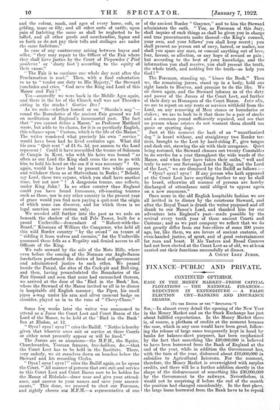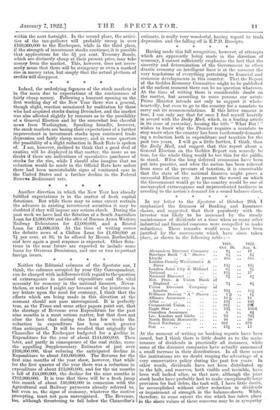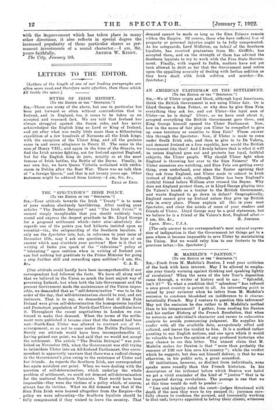FINANCE—PUBLIC AND PRIVATE.
CONTINUED OPTIMISM.
EASE IN THE . MONEY MARKET—FRESH CAPITAL.
FLOTATIONS — THE NATIONAL FINANCES— REDUCTION IN EXPENDITURE — A FALSE ELECTION CRY—BANKING AND INSURANCE SHARES.
[To THE EDITOR OF THE " SPECTATOR_"] Sia,"—In almost every detail the opening of the New Year in the Money Market and on the Stock Exchange has just about fulfilled expectations. In the Money Market there is, of course, a plethora of credits at the moment because the ease, which in any case would have been great, follow- ing the release of large sums temporarily kept in hand by banks for balance-sheet purposes, has been emphasized' by the fact that something like £40,000,000 is believed to have been borrowed from the Bank of England at the end of the year, while in addition the Government has, with the turn of the year, disbursed about £10,000,000 in subsidies to Agricultural Interests. For the moment, therefore, the Money Market is overweighted with surplus credits, and there will be a further addition shortly in the shape of the disbursement of something like £30,000,000 by the Government to the railways. Nevertheless, it would not be surprising if before the end of the month the position had changed considerably. In the first place, the large loans borrowed from the Bank have to be repaid, within the next fortnight. In the second place, the activi- ties of the tax-gatherer will probably sweep in over £100,000,000 to the Exchequer, while in the third place, if the strength of investment stocks continues, it is possible that applications for the 5i per cent. Treasury Bonds, which are distinctly cheap at their present price, may bake money from the market. This, however, does not neces- sarily mean that there will be stringency or even a marked rise in money rates, but simply that the actual plethora of credits will disappear.
* * Indeed, the underlying firinness of the stock markets is in the main due to expectations of the .continuance of fairly cheap money. Following a buoyant opening on the first working day of the New Year there was a general, though slight, reaction occasioned by realization by those who had acquired stocks during December, and the market was also affected slightly by rumours as to the possibility of a General Election and by the somewhat less cheerful news from Washington. Speaking broadly, however, the stock markets are basing their expectations of a further improvethent in investment stocks upon continued trade depression and fairly cheap money, and in some quarters the possibility of a slight reduction in Bank Rate is spoken of. I am, however, inclined to think that a good deal of caution will be displayed in that matter, the more so no doubt if there are indications of speculative purchases of stocks for the rise, while I should also imagine that no reduction would be made in the Official Rate here unless there had been unmistakable signs of continued ease in the United States and a further decline in the Federal Reserve Rediscount rate.
* * * * Another direction in which the New Year has already fulfilled expectations is in the matter of fresh capital flotations. But while these may to some extent restrain the advance in existing investment securities it may be doubted if they will impose any serious check. During the past week we have had the flotation of a South Australian Loan for £3,000,000 and the offer of Buenos Ayres Western Railway Debentures for £2,000,000, and a Bristol Loan for £1,000,000. At the time of writing comes the definite news of a Chilian Loan for £1,650,000 at 7 per cent. at 95, to be offered by Messrs. Rothschild, and here again a good response is expected. Other flota- tions in the near future are expected to include some loans for Overseas Dominions, and one or two important foreign issues.
* * * * Neither the Editorial columns of the Spectator nor, I think, the columns occupied by your City Correspondent, can be charged with indifference with regard to the question of extravagance in national expenditure and the vital necessity for economy in the national finances. Never- theless, or rather I might say because of the insistence in my letters upon the need for economy, I think that the efforts which are being made in this direction at the moment should not pass unrecognized. It is perfectly true, as the Times and some other papers point out, that the shortage of Revenue over Expenditure for the past nine months is a most serious matter, but that does not alter the fact that during the last few 'weeks the reduction in expenditure has been much greater than anticipated. It will be recalled that originally the Chancellor of the Exchequer budgeted for a decline in Expenditure for the year of about £144,000,000. Then later, and partly in consequence of the coal strike, came the appalling Supplementary Estimates of just over £106,000,000, thus reducing the anticipated decline in Expenditure to about £40,000,000. The Returns for the first nine months of the year show, however, that while for the first quarter of the year there was a reduction in expenditure of about £13,000,000, and for the six months a fall of £44,000,000, the decline for the nine months is £102,000,000. It is true that there will be a fresh jump this month of about £40,000,000 in connexion with the Agricultural and Railway payments already referred to, but even so, the signs of economy, whatever the motive prompting, must not pass unrecognized. The Revenue, too, although threatening to fall below the Chancellor's estimate, is really very wonderful, having regard to trade depression and the falling off in E.P.D. Receipts.
Having made this full recognition, however, of attempts which are apparently being made in the direction of economy, I cannot sufficiently emphasize the fact that the sincerity and determination of the Government to effect drastic economy on intelligent lines is at the moment the very touchstone of everything pertaining to financial and economic developments in this country. That the Report of the Geddes Economy Committee ought to be published at the earliest moment there can be no question whatever. At the time of writing there is considerable doubt on the matter, but according to some persons our astute Prime Minister intends not only to support it whole- heartedly, but even to go to the country for a mandate to carry out its recommendations. If this latter rumour is true, I can only say that for once I find myself heartily in accord with the Daily Mail, which, in a leading article in its issue of yesterday, bearing the title " What Rot ! " wishes to know why the Premier requires a mandate to stop waste when the country has been vociferously demand- ing a reduction both in expenditure and taxation for the past two years. I will go a little further, I think, than the Daily Mail, and suggest that this report about a General Election on the Geddes Report can scarcely be true, for the whole thing would be too thin for the public to stand. When the long deferred economies have been put into practice, and when the nation has been relieved from some of the pressure of taxation, it is conceivable that the state of the national finances might prove a successful Election cry. At present the record on which the Government would go to the country would be one of unexampled extravagance and unprecedented- tardiness in acceding to the nation's demand for a sound balance-sheet.
• In my letter to the Spectator of October 29th I emphasized the firmness of Banking and Insurance shares, and suggested that their popularity with the investor was likely to be increased by the steady maintenance of dividends at a time when so many other industrial and financial concerns were compelled to make reductions. These remarks would seem to have been justified by the movements which have since taken place, as shown in the following table :— 1921. 1922.
Oct. 26. Jan. 4.
Alexanders Discount Company 94 .. 11 Barclays Bank " A " Shares 64 .. 6/ Lloyds 48s. .. 51s. . London County Westminster &
Parrs . • • • • • •
London Joint City & Midland National ..
National Discount ..
Nat. Prov. & Union Bank of England Union Discount Company of London ..
Williams Deacon " A " Shares Alliance Assurance ..
Atlas .. • •
Commercial Union ..
Eagle Star ..
Guardian Assurance Liv. London and Globe North British Mercantile ..
Royal Exchange ..
•• At the moment of writing no banking reports have been issued, but I think there is little doubt as to the main- tenance of dividends in practically all instances, while some of the discount companies have actually annotmced a small increase in their distributions. In all these cases the institutions are no doubt reaping the advantage of a very conservative policy during the past few years. In other words, dividends have not been distributed up to the hilt, and reserves, both visible and invisible, have been well looked after, so that now, although the joint stock banks have probably had to make exceptionally large provision for bad debts, the task will, I have little doubt, be accomplished without either reduction in dividends or impairment of strength in the balance-sheets. While, therefore, to some extent the rise which has taken place in the share values of these concerns may be in sympathy
• • • • • • • • • • •
131 61 151 74 74
• •
151 74 17 82;
8/
101 1+1 10 /14- 121 241 134 5 72 46 362 13/
J.
• •
111 1/ 11 141 2741 15xd.
64 721 50 378 15
with the improvement which has taken place in many other directions, it also reflects in special degree the increased popularity of these particular shares as per- manent investments of a sound character.—I am, Sir,












































 Previous page
Previous page